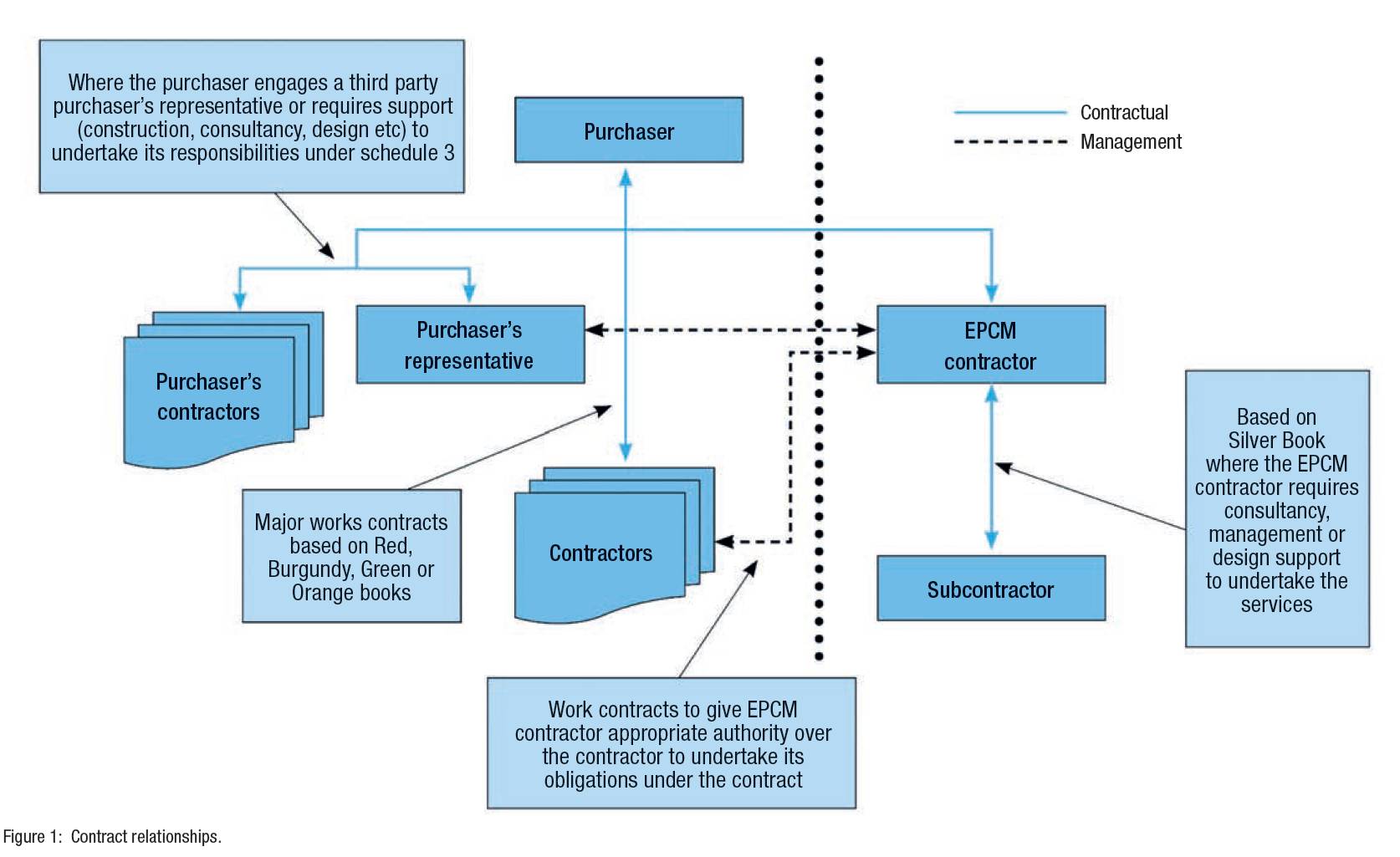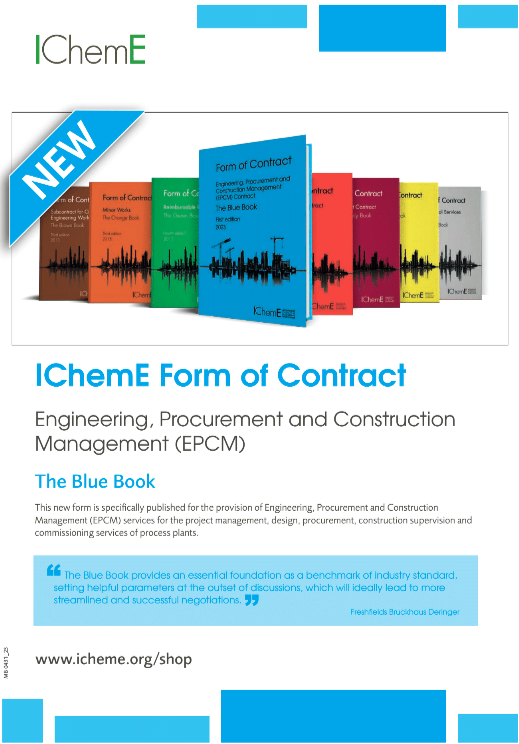Blue book launch
John Challenger, Chair, IChemE Contracts Committee

THE Institution of Chemical Engineers (IChemE) launched its latest form of contract on 16 May 2023 in Billingham, one of Britain’s largest centres for the chemical industry, The new form, to be known as the ‘Blue Book’, is specifically published for the provision of engineering, procurement and construction management (EPCM) services. Under this form of contract, it is emphasised that the EPCM contractor is not expected undertake the construction or installation works as these elements as these activities will generally be carried out by contractors appointed under individual works contracts to be arranged between each contractor and the purchaser.
It should be noted that if the EPCM contractor is to undertake any construction this would not be a part of the EPCM contract but would be undertaken under a separate works contract. The EPCM contractor’s role is therefore to manage the overall project and, if required, to undertake and/or manage the overall design of the plant. It is now common practice that elements of the design of a process plant to be undertaken by contractors and suppliers and in this regard the contract requires the EPCM contractor to act on behalf of the purchaser as the project manager within each works contract.
Many discussions took place on how to develop the contract given the wide range of opinions that exist in the industry as to the exact nature of an EPCM method of project execution.The IChemE decided to embark upon the drafting of the new form as it had become aware of an increasing demand for contractual arrangements that allowed purchaser’s to appoint contractors with the necessary capability to manage and deliver major projects but without the financial and liability risks associated with lump sum or target cost contracts, in which, the entire project cash flow would pass through the contractor’s accounts.
In addition, the purchaser may decide that it is advantageous to maintain long term direct relationships with specific suppliers for either commercial, technical or confidentiality reasons. In the United Kingdom there has been a notable reduction in the number of contractors willing to take on the total design and construction responsibility for contracts for a number of reasons which are not the subject of this article.
It should be pointed out that the adoption of EPCM format for project execution is not necessarily a desire of purchasers but in many instances is a necessity.
Many discussions took place on how to develop the contract given the wide range of opinions that exist in the industry as to the exact nature of an EPCM method of project execution. After many hours of deliberation, the drafting team believes it has steered a path that is both balanced, fair to the parties and equates liabilities to the responsibilities and abilities for the parties to actually pay in the event of default during the contract execution.
The management and project coordination roles and responsibilities of the EPCM contractor under the Blue Book contract are more extensive than those required by a professional services contract.Early in the drafting process, the graphical representation of the contract relationships shown in Figure 1 provided guidance for the primary commercial and management interactions within the EPCM contract that are normally expected to be adopted during the project execution.
It is interesting to note that several EPCM projects have already been commenced using a modified version of the IChemE professional services contract (the Silver Book) in addition to various bespoke contractual arrangements that have been used in the past. The management and project coordination roles and responsibilities of the EPCM contractor under the Blue Book contract are more extensive than those required by a professional services contract, as they are often silent on several issues that are essential to the execution of EPCM based projects, in particular, the multiple contractual relationships, responsibilities and liabilities that inevitably exist.

The overall structure and guidance
The general structure of the Blue Book is similar both in its content and arrangement to the establish IChemE contracts since it contains a typical form of agreement and a set of general conditions of contract between the purchaser and the EPCM contractor and requires for its successful execution accurately drafted specification and schedules. The form is structured to be able to incorporate reimbursable, fixed or target price arrangements for the EPCM contractor’s services.
Guidance is provided on how to compile the specification and the schedules to which reference is made throughout the general conditions. Guide notes are included to aid interpretation of some of the general conditions and to explain the possible need for certain optional or special conditions. As with other IChemE forms of contract, users of the Blue Book are strongly advised to read the relevant guide notes before preparing the specification, the schedules, and any special or optional conditions, all of which will need to be written individually to reflect specific contract/project requirements.
As previously stated, the supply and construction activities are undertaken by third party contractors. The Blue Book does not incorporate a draft works contracts but it is envisaged that the one or more of the existing IChemE forms of contract may be used as a basis of any works contracts since they are in a form that will readily integrate with the EPCM contract and are routinely used in the process industries. For example, the Red Book (lump sum contract), Burgundy Book (target price) and Orange Book (minor works contract) could be easily adapted to suite most works contract requirements. It may also be the case that a purchaser may have its own standard forms of contract that it uses for materials or equipment procurement and whilst these may be preferred, it is important that they are suitably modified to operate within the Blue Book structure.
Cooperation
The IChemE has always adopted the basic philosophy that the parties should cooperate to achieve the mutual objective of a successful project, rather than regarding the contract as simply the basis for an adversarial relationship. The IChemE has always adopted the basic philosophy that the parties should cooperate to achieve the mutual objective of a successful project, rather than regarding the contract as simply the basis for an adversarial relationship. As with any ‘services’ based contracts, cooperation between the purchaser and the EPCM contractor is essential to the ultimate success of a project. Of equal importance is the establishment of a reliable and robust supply chain since the successful outcome of the works is dependent on the performance of the contractors appointed to undertake the works.
The importance of specialist manufacturing companies that will act as suppliers or contractors for the construction works are critical since the EPCM contractor and the purchaser will be dependent on the specialist knowledge of the systems, equipment and materials that they provide. It should also be noted that the EPCM contractor is appointed to provide a professional service and expertise to assist the purchaser as defined in schedule 1 (description of the services and works) and this philosophy is particularly important since it acts as project manager in each of the works contracts. It is in the best interests of the parties to deal reasonably and fairly because the EPCM contractor must represent the purchaser’s interests when managing the works contracts and the project as a whole.
The parties should work together in an atmosphere of cooperation and mutual respect to achieve satisfactory solutions to the technical and commercial issues that will inevitably arise during the course of an EPCM project.

The optional conditions
The form of contract for EPCM services is structured so that it may be used in any location. and the contract will require the drafting of optional and special conditions to deal with those matters which will be specific to the chosen governing law and/or location of any intended project.
An important factor to be considered is the close working relationship and cooperation between the parties in managing and coordination the works contracts.
The form includes example optional conditions which have been divided into three sections, the first relating to projects that are wholly or partially undertaken in the United Kingdom (part A), the second provides for the execution of the contract under a target price regime (part B) and the third covering requirements either due to the specific content of the project or to the execution of the services under specific laws or regulations in the legal jurisdiction in which the contract is to be executed (part C).
Detailed guidance is provided to assist the user when compiling the optional conditions. The IChemE warns against radical alterations to the Blues Book as it may alter the balance of the contract in favour of one party. It is emphasised in the guide notes ‘that anyone contemplating modifications to the general conditions should take care not to introduce provisions which may conflict with these well-established practices and relationships in the process industries or that may conflict with national or regional legislation’ or to disrupt the intended precedence within the contract. Users should particularly be aware of the risk of introducing inconsistencies within the conditions, or provisions that may be unenforceable.
Pre-contract issues
Comparison of tenders for EPCM contracts can present different challenges from a design and construct contract tender invitation. It is important that the purchaser establishes suitable criteria that will enable reliable comparisons to be made between competing tenders.
The general conditions have been drafted to facilitate the controlled transition between the initial budget or programme of works to an approved and mutually acceptable status. Because of the difficulty of comparing the different amounts and rates estimated by the various tenderers the final decision will depend substantially on the purchaser’s assessment of the technical and management capability of the potential EPCM contractors.
An important factor to be considered is the close working relationship and cooperation between the parties in managing and coordination the works contracts. It is therefore important to ensure that records of the recent past performance of any potential EPCM contractor in the relevant field of technology and on similar projects is established and fully assessed.
Contracts of this type will require important criteria to be fully defined and will therefore need considerable resources of experienced personnel and time to compile properly and accurately.
Some key elements of the contract
It is recognised within the contract that the purchaser may choose to enter into contract at a stage when the technical definition or aspects of the project execution methodology have not been fully defined. This may mean that aspect of the specification, the schedules and the commercial strategy are yet to be fully defined. The general conditions have been drafted to facilitate the controlled transition between the initial budget or programme of works to an approved and mutually acceptable status.
Clearly at the start of any EPCM contract the cost of the works may, of necessity, be based on estimates established prior to the placement of works contracts. Many factors can change between the initial signing of an EPCM contract and the completion of the design and procurement phases of the project.
The Blue Book recognises these factors and seeks to provide practical and controlled procedures to support the development of the technical, commercial and time parameters. It is because of this relatively open and sometimes necessary situation at the commencement of an EPCM project, that it is anticipated that a reimbursable pricing arrangement is likely to be adopted but with appropriate controls in place such as a target price arrangement or a cap on expenditure to avoid uncontrolled cost increases.
The Blue Book, like other IChemE forms of contract contains sections including the specification which defines the plant plus a series of schedules that provide the methodology of how the project is to be executed.In addition to the agreement and general conditions, the Blue Book, like other IChemE forms of contract contains sections including the specification which defines the plant plus a series of schedules that provide the methodology of how the project is to be executed. It is essential that users recognise that specification and the schedules are fully integrated with the general conditions.
Takeover is a key stage in the execution of the contract under the IChemE forms as it is very important from both contractual and safety points of view that responsibility for the plant should pass from the EPCM contractor to the purchaser in a clearly defined and unambiguous manner. The time for this to be done would normally be before any raw materials are fed into the plant. Under some circumstances, the EPCM contractor may take responsibility for the initial operation of the plant during a takeover test period but from the time of takeover the purchaser is responsible for the care, operation, maintenance, and safety of the plant.
It should also be noted that the defects liability period starts on the date of taking over.
Clearly such matters are not easy to manage particularly due to the inter-relationship between sections or systems of a process plant and as a result the sequencing of construction completion and taking over will need to be carefully managed by the EPCM contractor in conjunction with the purchaser. If several sections need to be tested to an agreed standard prior to a takeover certificate the roles and responsibilities of each works contractor will need to be thoroughly planned and coordinated by the EPCM contractor.
It is important to note that if a section of plant has been taken over and is subsequently under the control of the purchaser, the EPCM contractor will no longer have possession of the site and, consequently, responsibility for all health, safety and care of the works liabilities are transferred to the purchaser.
As the EPCM contractor’s role in the EPCM contract is one of a service provider, the fitness for purpose obligations that exist in the IChemE Red, Green and Burgundy contracts, do not exist in the Blue Book.
The Blue Book allows for a totally undefined start in which initial budgets and initial programmes can be the starting point with a gradual movement to approved budget and programme as the project progresses.The general conditions provide that the EPCM contractor is responsible for providing the necessary services to make good any defects found in the works contracts, to the cost of the purchaser, except where the defect is due to the failure of the EPCM contractor to exercise due skill and care.
The defects liability period remains in common with the other IChemE forms and generally expires 12 months after the taking over of the plant. Careful consideration of the liability periods for each works contract needs to be considered particularly if the overall plant is to be completed in sections.
In general, the Blue Book adopts the same sequential and structured approach regarding the necessary off-site testing, completion of construction, takeover and performance testing that is a feature of the other IChemE contracts, except the role of the EPCM contract is limited to management of the works contracts and thorough coordination of the project as a whole. In many respects, EPCM contracts are one of the most complex of forms to set up and execute because of the additional layers of communication and management that are required between the EPCM contract, the contractors and the purchaser.
Despite this, if managed well this method of executing projects can be very successful and can provide significant benefits to the parties, particularly in the modern contracting environment.
Advantages of EPCM
The Blue Book allows for a totally undefined start in which initial budgets and initial programmes can be the starting point with a gradual movement to approved budget and programme as the project progresses. The following as considered to be the advantages associated with the EPCM approach:
- As stated in the introduction, there is a limited contractor capacity in the process engineering and energy sectors and with high project demand the use of EPCM methodology for project execution can contribute attracting additional resources particularly where contractors are becoming less willing to take full EPC fixed price risk.
- Suitable for projects where the technology risk is high and the processes are novel.
- The ownership or provision of the process technology can impact on the choice of contract, in this regard the Blue Book provides a very flexible format in which the purchaser can exert greater control over the project execution whilst gaining the expertise of the EPCM contractor in terms of project execution expertise.
- EPCM contractor can be encouraged to develop solutions to improve the outcome of a project within a reasonably low risk environment provided it performs its services in a fully professional manner.
- Purchasers may require greater control and oversight of highrisk projects and use an established supply chain.
- If managed correctly, EPCM contracts can provide a platform for a faster and more cost-effective project execution.
- EPCM based projects can reduce the risk contingency premiums and liabilities that exist in EPC.
- EPCM contracting models offer greater flexibility regarding procurement, and pricing and may result in shorter project programmes.
- The purchaser can issue variations at any stage of the project and adopt different strategies as the project progresses.
- Although it requires greater monitoring capacity and capability, the purchaser can maintain a closer control of and programme.
- Sufficient protection against unknowns is provided for any competent EPCM contractor to navigate successfully.
In addition to the above, the Blue Book retains all of the detailed requirements for the execution of performance based contracts such as the testing regimes, programme and cost management that have a proven track record in the process and manufacturing industries.
John Challenger, Chair, IChemE Contracts Committee